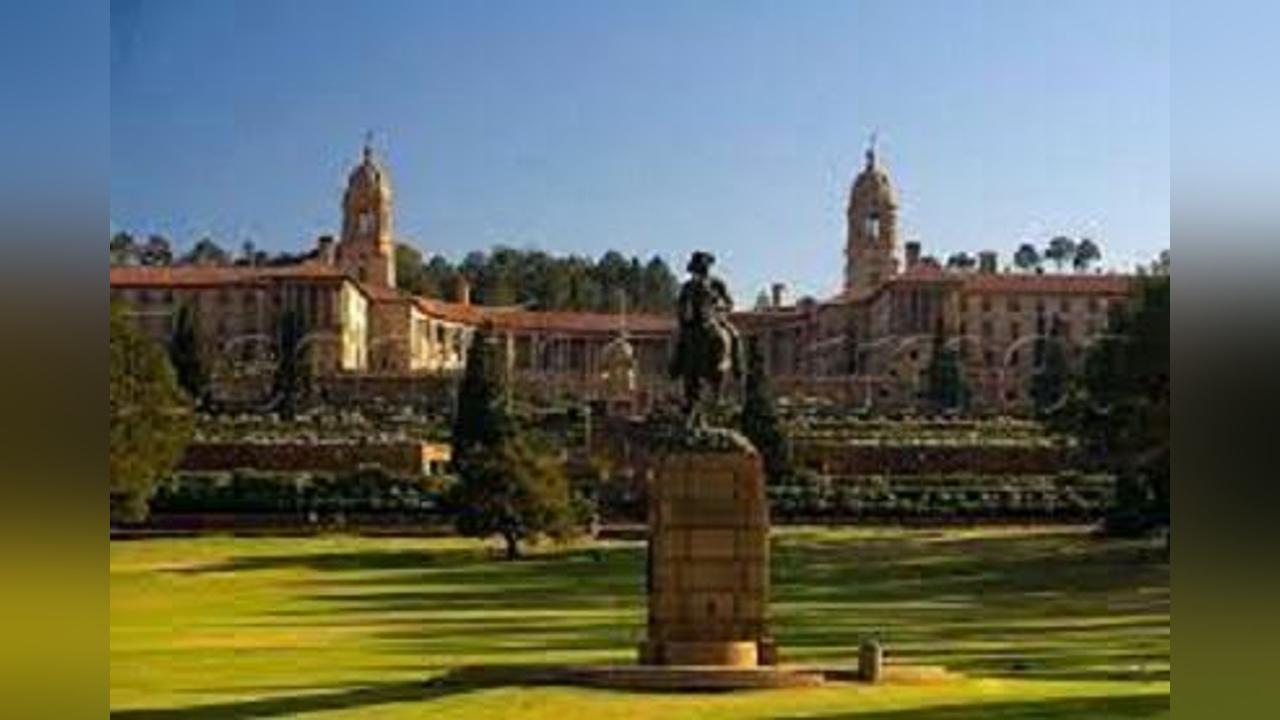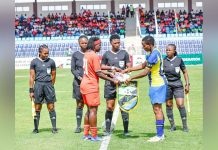Africa-Press – Lesotho. PRIME Minister Moeketsi Majoro’s quest to overturn a South African arbitrator’s award of £50 million (M856 million) damages to Frazer Solar has received a boost from the South African government which has decided to fight in his corner.
The South African government argues that granting Frazer Solar damages from Lesotho’s revenues due to it in terms of the Lesotho Highlands Water Project (LHWP) would irreparably harm the diplomatic relations between the two countries.
It further argues that Lesotho could retaliate by cutting water supplies to South Africa in terms of the 1986 treaty between the two countries. The South African government’s arguments are contained in the court papers recently filed in the Gauteng High Court by the Trans-Caledon Tunnel Authority (TCTA).
The TCTA is the South African government’s implementing arm of LHWP treaty which ensures constant water supplies to South Africa from Lesotho. It pays royalties to Lesotho for the water.
Frazer Solar has moved to have the water royalties garnished as part of efforts to recover some of the money owed to it by the Lesotho government in terms of the damages award.
Frazer Solar was awarded the massive damages by arbitrator, Vincent Maleka, for the government’s alleged breach of a 2018 deal for the German company to supply Lesotho with solar power and related equipment over four years.
In April this year, Frazer Solar successfully petitioned the Gauteng High Court to endorse the award and allow it to garnish Lesotho’s revenue from the sale of water to South Africa in terms of the LHWP treaty entered into by the two countries in 1986.
Dr Majoro subsequently petitioned the same court to reverse its decision on the grounds that there was no binding agreement between the two parties. The premier even accused former Minister in the Prime Minister’s Office, Temeki Tšolo, of corruptly and fraudulently signing the initial agreement which Frazer Solar used as the basis for its damages claim.
Dr Majoro has also filed another application in the Lesotho High Court to stop Frazer Solar from seizing any of the state’s assets. His South African court application has now received the support of the South African government.
In its court papers, the TCTA argues that the royalties should not be garnished to pay Frazer Solar as they are supposed to be paid out to the Lesotho Highlands Development Authority (LHDA) which has a separate legal existence from the Lesotho government with whom the German company has a contractual dispute.
“Trans-Caledon owes the cost related payments to the Highlands Authority (LHDA),” the TCTA argues in its court papers filed in support of the Lesotho government’s application on 28 October 2021.
“Those claims belong to the Highlands Authority. The Highlands Authority and Lesotho are separate persons in law. Frazer has a judgment against Lesotho.
Frazer views the Highlands Authority’s assets as fair game. It cannot send the sheriff to attach the Highlands Authority’s assets. “The test is not whether Lesotho owns the Highlands Authority.
Nor is the test about how international law treats the relationship between them. Rather, the test asks whether the Highlands Authority is a separate legal entity.
If it is a separate legal entity, then its assets are its own, not that of its shareholders,” the TCTA argues. In any event, South Africa’s Foreign States Immunities Act protects a foreign government’s assets from seizure as contemplated by Frazer Solar, the TCTA argues.
“Section 14(1) (b)(ii) of the Foreign States Immunities Act states that “the property of a foreign state shall not be subject to any process .
. for the enforcement of a judgment or an arbitration award”. Lesotho’s royalties are “property of a foreign state” within the meaning of section 14(1) (b)(ii).
A debt that Trans-Caledon owes Lesotho is the “property” of Lesotho under section 14(1)(b)(ii). “This general rule is subject to two exceptions: a consent exception and a commercial-use exception.
Neither exception applies. The commercial-use exception applies to ‘property which is for the time being in use or intended for use for commercial purposes’. But the royalty claims are not ‘in use or intended for use for commercial purposes’.
“The royalties are paid pursuant to an international treaty that is primarily aimed at developing sustainable sources of water for South Africa and electricity for Lesotho.
The treaty’s purpose is not commercial and Lesotho does not make a commercial gain from the royalty payments. For these reasons, Frazer is not entitled to attach the royalties Trans-Caledon owes Lesotho.
TCTA further argues that allowing Frazer Solar to seize the water royalties would not only irreparably harm relations between Lesotho and South Africa, it would also threaten the LHWP treaty and the security of South Africa’s water supplies from Lesotho.
“Trans-Caledon supports Lesotho’s application. The Highlands Authority incurs the costs to run the Project (to supply water to South Africa).
If royalties are not paid to the Highlands Authority—because Trans-Caledon must pay them to Frazer— the Project will not operate at optimal levels, and its planned expansion will likely come to a halt.
The Highlands Authority routinely hires third party contractors to maintain the Project. The Project needs regular maintenance to function properly. If Trans-Caledon pays the costs to Frazer instead of the Highlands Authority, contractors will not be paid.
If they are not paid, they will not work. This will, in turn, increase the risk of operational failures and, ultimately, risk Gauteng’s taps running dry.
“The costs also cover expenses for the expansion of the next phase of the Project.
The Highlands Authority has already concluded contracts with third parties for several construction projects necessary for the new phase. The contracts are time-sensitive with substantial delay penalties.
Without the costs, the Highlands Authority will not be able to pay these contractors. There may be delays, breaches, and reverberating damages claims. Delays to the new phase will also undermine South Africa’s water security in the future.
“As far as the royalty payments go, Trans-Caledon paying them to Frazer instead of Lesotho risks irreparable harm to Lesotho’s economy, as Lesotho predicts.
And quite apart from an economic fallout, Lesotho has already indicated to the government of South Africa that it will view a failure to pay the royalty payments as a breach of the treaty.
If Lesotho treats non-payment of the royalty payments as a breach of the treaty, there is a risk that Lesotho may stop or reduce the supply of water to South Africa.
The government of South Africa would have no easy remedy; a long-term interruption to one of South Africa’s major sources of water would be inevitable.
“For these reasons, execution of Frazer’s judgment debt risks irreparable harm to diplomatic relations between Lesotho and South Africa, to the continued existence of the treaty and the Lesotho Highlands Water Project, and to the security of South Africa’s water supply,” TCTA argues.
Meanwhile, Frazer Solar and the Lesotho government have issued separate statements indicating that the case in the Gauteng High Court has been postponed to a date yet to be decided.
Dr Majoro’s press attaché, Buta Moseme, said the postponement was due to the South African government’s decision to file papers in support of the Lesotho government’s application for the nullification of the damages award.
On the other hand, Frazer Solar argued that the filing of the application by the South African government was highly irregular. “This highly irregular step was intentionally taken to delay the court hearing.
Frazer Solar said in a statement this week.
“On Monday 8 November, two days before the hearing was due to start, the Court ordered a delay with a new hearing date yet to be determined but likely to be in 4 to 5 months.
“Lesotho Prime Minister Moeketsi Majoro’s legal team have offered to delay a critical hearing in the South African High Court two days before it was due to start, gifting Frazer Solar a critical win in its ongoing legal dispute.
The decision belies previous statements about the urgency of freeing up much-needed funds. If the Prime Minister was so sure of his case, why offer the delay?
“It’s not the action of a man who expects to win. Despite months of rhetoric from Dr Majoro on the strength of his government’s case, at the first real test, he has wavered.
We have no difficulties with Lesotho government’s demand that the hearing be delayed and the royalties remain frozen. In one fell swoop, they have undermined their own case for urgency and their allegedly dire need for the financial royalties,” Frazer Solar said in a statement this week.
For More News And Analysis About Lesotho Follow Africa-Press






